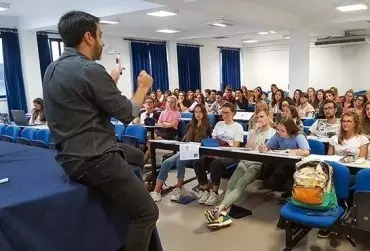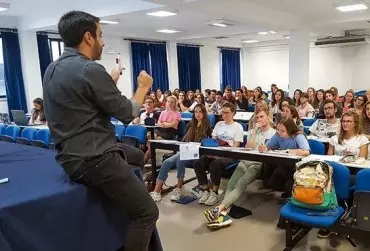 José Miguel de Campos, DVM PHD got his Master’s Degree at Vasco da Gama University School (EUVG) in Coimbra, the oldest and most important academic city in Portugal. He made postgraduate studies in areas of soft tissue surgery, orthopaedics, intensive therapy and anaesthesia. He also accomplished a lot of externships at European Universities and private practices in several countries. He got his PhD in Veterinary Sciences at University of Porto, in the area of biomaterials and cell therapies for bone regeneration. His research on the use of dental pulp stem cells to bone regeneration in dogs served to develop new therapy, which he is using in his private clinic, Veterinary Surgical Center Assafarge. He has been also the teacher of theoretical and practical anatomy at EUVG since 2014. He is the member of the Royal College of Veterinary Surgeons, Portuguese Association of Expert Veterinary Surgeons in Company Animals and British Small Animal Veterinary Association. In an interview with Vet Trends, he shares his insights into the work of a veterinarian in Portugal, his thoughts on the future of veterinary orthopaedics and the need of sharing the clinical knowledge.
José Miguel de Campos, DVM PHD got his Master’s Degree at Vasco da Gama University School (EUVG) in Coimbra, the oldest and most important academic city in Portugal. He made postgraduate studies in areas of soft tissue surgery, orthopaedics, intensive therapy and anaesthesia. He also accomplished a lot of externships at European Universities and private practices in several countries. He got his PhD in Veterinary Sciences at University of Porto, in the area of biomaterials and cell therapies for bone regeneration. His research on the use of dental pulp stem cells to bone regeneration in dogs served to develop new therapy, which he is using in his private clinic, Veterinary Surgical Center Assafarge. He has been also the teacher of theoretical and practical anatomy at EUVG since 2014. He is the member of the Royal College of Veterinary Surgeons, Portuguese Association of Expert Veterinary Surgeons in Company Animals and British Small Animal Veterinary Association. In an interview with Vet Trends, he shares his insights into the work of a veterinarian in Portugal, his thoughts on the future of veterinary orthopaedics and the need of sharing the clinical knowledge.
Dział: Wywiad
 Doktor nauk weterynaryjnych José Miguel de Campos dyplom lekarza weterynarii zdobył w School of Agriculture of Coimbra, w mieście będącym najstarszym i najważniejszym ośrodkiem akademickim w Portugalii. Ukończył studia podyplomowe z zakresu chirurgii ogólnej i anestezjologii oraz chirurgii tkanek miękkich, ortopedii i intensywnej terapii. Doświadczenie zdobył również na licznych stażach w wielu państwach Europy. Adiunkt w Katedrze Anatomii w School University Vasco da Gama oraz członek zespołu badawczego na University of Porto. Szef prywatnej kliniki chirurgicznej Veterinary Surgical Center Assafarge, w której stosuje nowatorską terapię złamań kości opartą na wykorzystaniu komórek macierzystych miazgi zęba. Członek Royal College of Veterinary Surgeons, British Small Animal Veterinary Association oraz Portuguese Association of Expert Veterinary Surgeons in Company Animals. W wywiadzie udzielonym dla „Vet Trends” dzieli się swoimi spostrzeżeniami dotyczącymi pracy lekarza weterynarii w Portugalii, przyszłości ortopedii weterynaryjnej i konieczności szerzenia i popularyzowania fachowej wiedzy.
Doktor nauk weterynaryjnych José Miguel de Campos dyplom lekarza weterynarii zdobył w School of Agriculture of Coimbra, w mieście będącym najstarszym i najważniejszym ośrodkiem akademickim w Portugalii. Ukończył studia podyplomowe z zakresu chirurgii ogólnej i anestezjologii oraz chirurgii tkanek miękkich, ortopedii i intensywnej terapii. Doświadczenie zdobył również na licznych stażach w wielu państwach Europy. Adiunkt w Katedrze Anatomii w School University Vasco da Gama oraz członek zespołu badawczego na University of Porto. Szef prywatnej kliniki chirurgicznej Veterinary Surgical Center Assafarge, w której stosuje nowatorską terapię złamań kości opartą na wykorzystaniu komórek macierzystych miazgi zęba. Członek Royal College of Veterinary Surgeons, British Small Animal Veterinary Association oraz Portuguese Association of Expert Veterinary Surgeons in Company Animals. W wywiadzie udzielonym dla „Vet Trends” dzieli się swoimi spostrzeżeniami dotyczącymi pracy lekarza weterynarii w Portugalii, przyszłości ortopedii weterynaryjnej i konieczności szerzenia i popularyzowania fachowej wiedzy.




